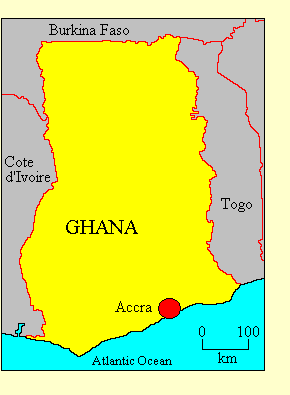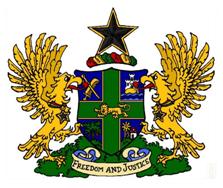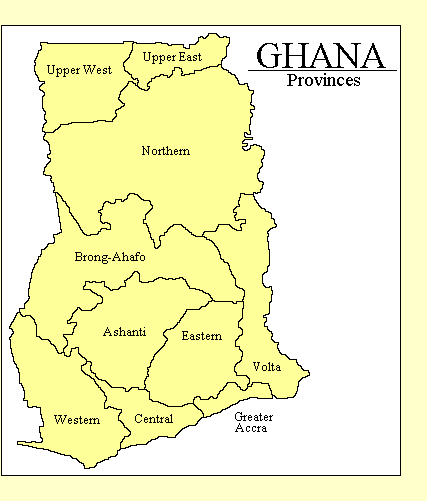

REPUBLIC OF GHANA
• Official name: Republic of Ghana
• Location: West Africa
• International organisations: African, Caribbean and Pacific Group of States, African Union,
The Commonwealth of Nations, Non-Aligned Movement, United Nations, World Trade Organisation
• Borders: Burkina Faso, Cote d'Ivoire, Togo
• Coastline: Gulf of Guinea
• Land area: 239,460 Km2
• Population: 23,800,000
• Annual GDP (PPP) per capita: US$1,500 (2009 CIA estimate). World ranking: 166
• Ethnicity: Nearly all of Ghana's people are of African stock, the principal ethnic
groups being the Akan (44%), Moshi-Dagomba (16%), Ewe (13%), Ga (8%), Gurma (3%) and
Yoruba (1%). There are small European and Indian minorities.
• Languages: English is the official language and the language of business and the media.
Many African languages are spoken, corresponding to the ethnic groups listed above.
• Religion: Christian 63%, indigenous beliefs 21%, Moslem 16%
• Form of government: Presidential democratic republic. Ghana is divided into ten regions.
• Capital: Accra
• Constitution: The new
Constitution of the Republic of Ghana was
approved on 28 April 1992.
• Head of state: The President, elected by direct universal suffrage for a four-year term.

• Head of government: The President, who appoints all ministers.
• Legislature: Ghana has a unicameral legislature. The
Parliament has 200 members, elected for
four-year terms single-member constituencies.
• Electoral authority: The Ghana Election Commission administers national elections.
• Freedom House 2011 rating: Political Rights 1, Civil Liberties 2
• Transparency International Corruption Index: 41% (62 of 178 countries rated)
• Reporters Without Borders Press Freedom 2010 Index: 92% (26 of 178 countries rated)
• Heritage Foundation Economic Freedom 2010 Index: 59.4% (95 of 178 countries rated)
Political history
The coastal areas of what is now Ghana, then known as the Gold Coast, came under
British control in the late 18th century. This brought the British into conflict with
the powerful kingdom of the Ashanti, which dominated the inland areas. The Ashanti
were not defeated until 1896. The inland areas become a British colony in 1901. In 1919
former German territory in the west was added to the colony. During the early 20th century
a policy of indirect rule was followed, but after the Second World War the British began
to prepare the colony for self-government.
A nationalist movement, the United Gold Coast Convention, led by Kwame Nkrumah,
began agitation for full independence in 1947. Elections were held in 1951, which
Nkrumah's party, now called the Convention People's Party, won overwhelmingly, although
the Ashanti areas did not support Nkrumah. The country, renamed Ghana after an ancient
kingdom, became independent in March 1957, the first European colony in Africa to do so.
A republican constitution was introduced in 1960 and Nkrumah became president.
But economic difficulties and regional conflict led Nkrumah's government to become
increasingly authoritarian, and a one-party regime was established in 1965, setting a
precedent which was to cause immense suffering in many African countries. Another
precedent was established in 1966 when Nkrumah was deposed by an army coup.

Ghana's history from 1966 from 1996 was one of recurring coups and economic crises.
Attempts to return to civilian rule in 1969, 1974 and 1979 were unsuccessful, each
attempt ending in a coup. The 1979 coup brought an air force officer, Jerry Rawlings,
to power. Rawlings established an authoritarian socialist regime which was at least
stable, and held power until 1992, when a new democratic constitution was introduced.
In 1996 Rawlings, having embraced democracy and the free market, was elected
president, and in 2000 he retired and John Agyekum Kufuor, the opposition candidate, was
elected to succeed him, marking Ghana's successful transition to democracy.
Ghana now has a stable two-party system. The leading parties are the left-wing
National Democratic Congress (NDC) founded by president
Rawlings and former President Kufour's liberal New Patriotic Party (NPP). At the 2008 presidential
election John Atta-Mills of the NDC had a very narrow over the
NPP's Nana A D Akufo-Addo.
Freedom House's 2011 report on Ghana
says: "Ghana is an electoral democracy. The December 2008 presidential and parliamentary elections were considered fair and
competitive... One of [John] Atta Millsís campaign promises was to fight corruption and improve governance. The NDC
administration has used the Bureau of National Investigation to examine corruption allegations against a number of former
NPP officials... Freedom of expression is constitutionally guaranteed and generally respected. Numerous private radio
stations operate, and many independent newspapers and magazines are published in Accra... The rights to peaceful assembly
and association are constitutionally guaranteed, and permits are not required for meetings or demonstrations...
Ghanaian courts have acted with increased autonomy under the 1992 constitution, but corruption remains a problem. Scarce
resources compromise the judicial process, and poorly paid judges are tempted by bribes."
Updated November 2011
|


